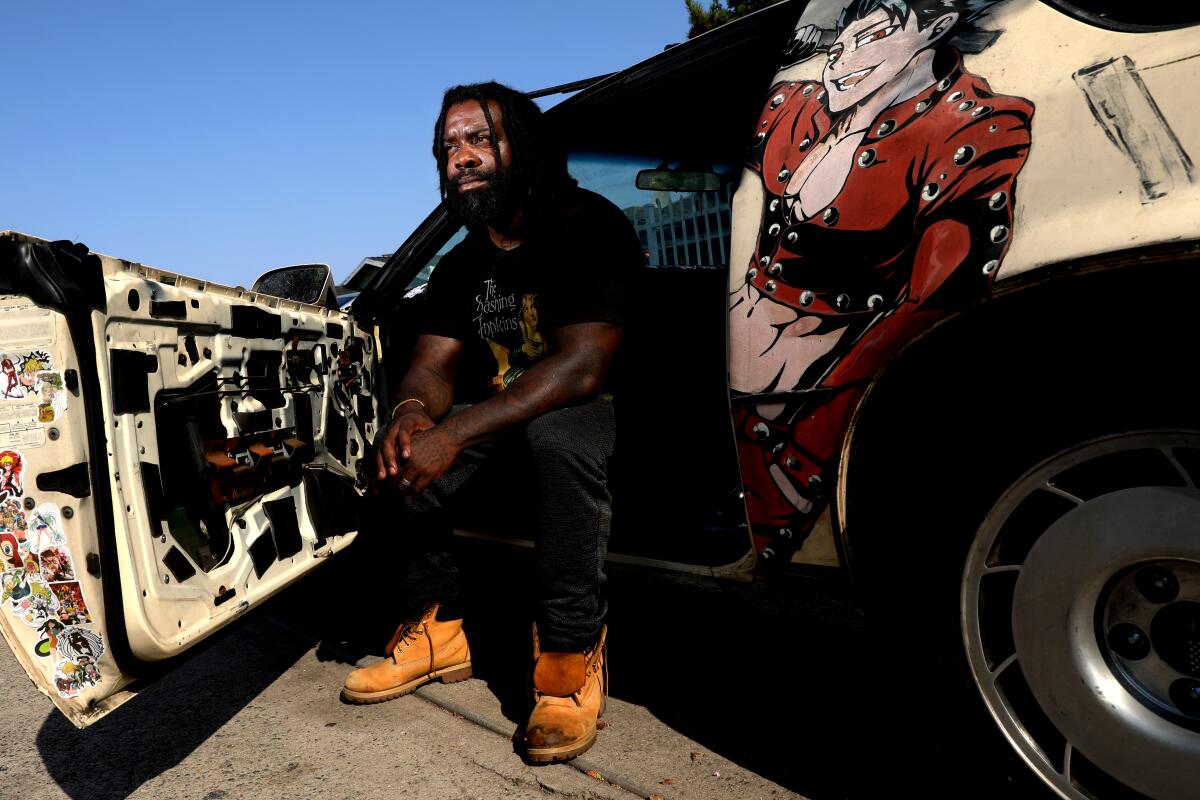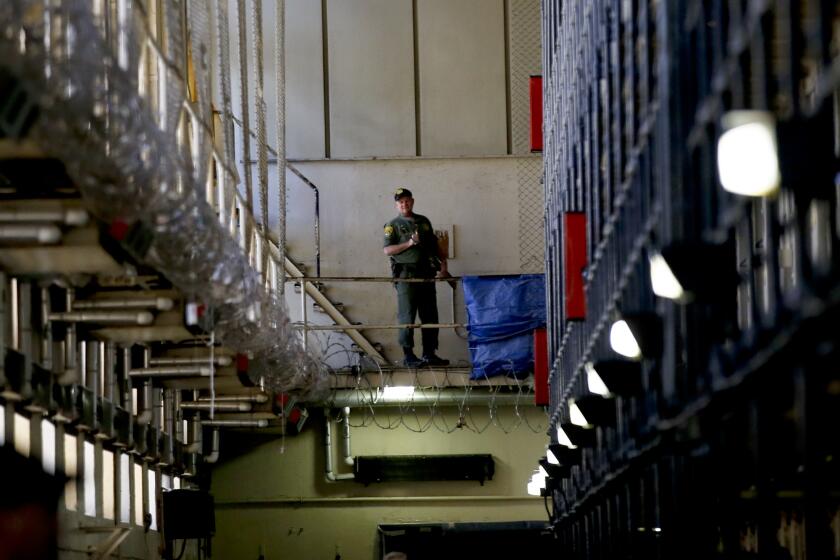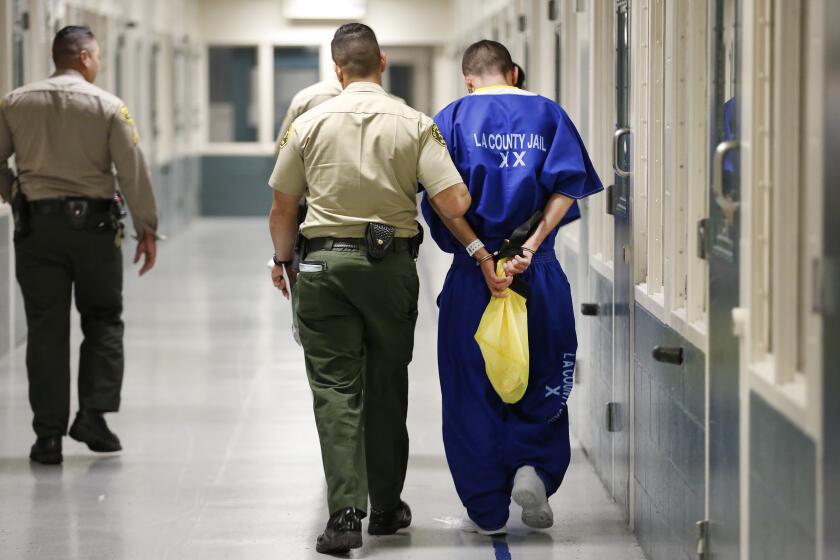Criminal justice panel says California should pay restitution to victims, ban some traffic stops

- Share via
California should set up a taxpayer-funded restitution system for crime victims, curtail the use of money bail and limit when cops can make traffic stops that disproportionately affect Black and Latino drivers, according to recommendations from a criminal justice panel that advises state lawmakers.
Although those recommendations could be eclipsed by budget constraints as the state faces a possible $25-billion deficit next year, California still must do more to assist crime victims, said Michael Romano, the committee’s chairman and director of the Stanford Law School Three Strikes Project.
The panel’s most ambitious new proposal is to establish a state-financed restitution system for crime victims, which could include money to immediately cover lost wages, mental health counseling, medical bills and damaged property. The fund would provide restitution for damages incurred during a violent crime, but also apply to everyday occurrences such as stolen bikes and phones or broken car windows.
“What we’re doing right now in terms of restitution is not helping crime victims for the most part,” Romano said.
The Condemned Inmate Transfer Pilot Program has moved more than 100 people off of death row at San Quentin State Prison and the California Central Women’s Facility and into other housing locations, according to the California Department of Corrections and Rehabilitation.
The state Legislature and Gov. Gavin Newsom set up the panel in 2020 to evaluate the penal code and make recommendations to reduce the prison population and rectify racial disparities in the justice system. Thus far, the work of the California Committee on Revision of the Penal Code has led to a dozen changes in state law to encourage alternatives to incarceration in favor of rehabilitation and diversion tactics.
Those efforts include limits on using gang and other sentencing enhancements to lengthen prison terms, and a new process to remove those suffering from incurable mental illnesses from death row who often don’t understand that they face execution. The panel also supports repealing the death penalty and shutting down death row.
A recommendation implemented last year led to an increase in funding for reentry programs that help incarcerated people transition back into their communities. Members of the committee include Democratic state lawmakers, criminal law scholars and former federal and state judges appointed by the governor and legislative leaders.
Romano said the panel’s proposals this year focus on changes sought by victims of crime. The shift comes amid recent criticism that the criminal justice reform movement has contributed to rising crime rates. While crime is far lower than it was in the ’80s and ’90s, violent and property crimes did increase in 2021, according to the state Department of Justice.
Judges currently order restitution after a person is convicted of a crime. The state also oversees a separate victim compensation fund to help pay a limited amount specifically for crimes related to physical injuries and death.
But the committee contends that those processes don’t always ensure victims are made whole. Instead, the panel said, the state should immediately provide financial assistance to ensure victims are made whole, and then possibly backfill those costs when they’re able to be collected from convicted individuals.
That new system could also reduce the “impact of criminal fines and fees on convicted persons,” the committee said.
A California committee is recommending an end to the state’s controversial ‘three strikes’ law and changes to lifetime prison sentences without the possibility of parole.
At least $150 million is ordered in restitution each year, according to a conservative analysis of available data, while a fraction of those costs are collected. Romano said the state often wastes time, money and energy to get “literally pennies” from people who commit crimes but can’t afford restitution charges.
It’s an expensive request ahead of an uncertain fiscal year. Newsom signaled through a series of legislative veto messages this fall that he anticipated “lower-than-expected revenues” and wanted the Legislature to “remain disciplined when it comes to spending.”
Other ideas proposed by the panel are less costly.
Those include establishing a “right to restorative justice,” meaning victims would be notified of opportunities to voluntarily participate in mediation with those who committed a crime against them. Preliminary legislation to create such a program has been introduced by Assemblymember Isaac Bryan, a Los Angeles Democrat who sits on the committee.
The members also recommended a ban on certain traffic stops that aren’t related to safety concerns, such as having expired registration tags or tinted windows.
An October report by the nonpartisan Public Policy Institute of California found that Black drivers are “markedly overrepresented” in traffic stops and while officers are more likely to search Black and Latino drivers, they’re less likely to discover contraband such as guns, drugs, alcohol or stolen property.
State Sen. Steven Bradford (D-Gardena) has introduced legislation to restrict an officer’s authority to initiate these so-called pretext stops, which the committee said should be limited to “only when the officer has reasonable suspicion to believe the search will uncover evidence of a crime.”
The proposal drew immediate criticism from Assemblymember Bill Essayli, a Republican former prosecutor who represents Riverside County. He said traffic stops often help prevent or discover crime and that limiting searches could “prevent officers from being effective.”
“[Officers] find drugs, they find evidence of crimes. They find guns on people who shouldn’t have guns,” Essayli said. “By limiting officers’ ability to conduct investigations through routine stops, I think it’s really dangerous and can really lead to a lot of crimes going undiscovered and unsolved.”
Essayli also took issue with a third major recommendation that would severely limit the use of money bail. For several years, lawmakers have worked on legislation to overhaul the bail system in California and replace it with one that evaluates public safety risk instead. Voters rejected that effort with a 2020 ballot measure.
But in a 2021 ruling, the California Supreme Court determined that it was unconstitutional to keep defendants behind bars just because they can’t afford bail. Instead, the court directed judges to favor pretrial release in cases where defendants were not a flight or safety risk and to consider what they could pay before setting a bail amount.
The committee said state lawmakers should clarify and codify that decision to ensure compliance.
“People often forget what the purpose of bail is,” Essayli said. “Bail is designed to ensure [defendants’] appearance in court and to protect public safety.”
“There’s a lot of nuance to bail,” Essayli added. “But I think there’s a false narrative that it’s this draconian system that punishes poor people and keeps them in jail. Often that’s not the case at all. The people who remain on high bail are often people who have committed or alleged to have committed very serious offenses.”
The Supreme Court ruling is a victory for criminal justice reformers, coming four months after California voters refused to end cash bail at the ballot box.
Criminal justice reform advocates had hoped the state Supreme Court decision would lead to the release of low-income people who didn’t pose public safety concerns. But a recent report by the Policy Advocacy Clinic at Berkeley Law and the Bail Practicum at UCLA Law found little evidence that the decision has lowered bail amounts throughout California or meaningfully reduced the pretrial jail population.
Rachel Wallace, clinical supervisor at UC Berkeley Law’s Policy Advocacy Clinic and a co-author of the bail report, said enshrining the decision in state law would help address inequities in the criminal justice system.
“We know that the vast majority of people in pretrial detention in California are people of color, particularly Black and brown individuals,” Wallace said. “And so we know that this is not only an economic issue, but a racial justice issue as well.”
Other policy recommendations include ensuring arrested people are appointed a public defender within 24 hours of booking or before their first court hearing if they can’t afford their own legal representation, and modernizing the state’s current process of “restoring” individuals to mental competence to stand trial.
More to Read
Sign up for Essential California
The most important California stories and recommendations in your inbox every morning.
You may occasionally receive promotional content from the Los Angeles Times.














